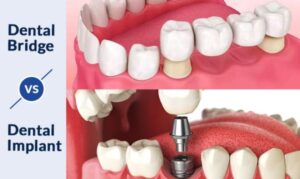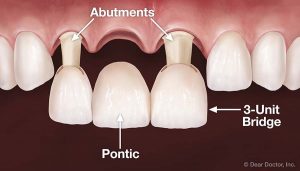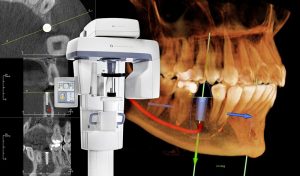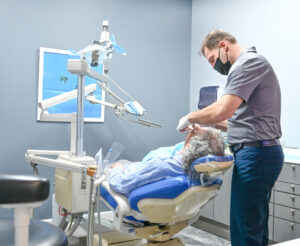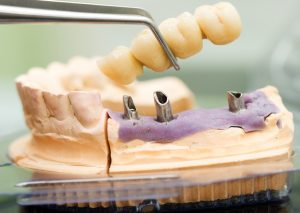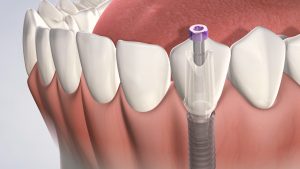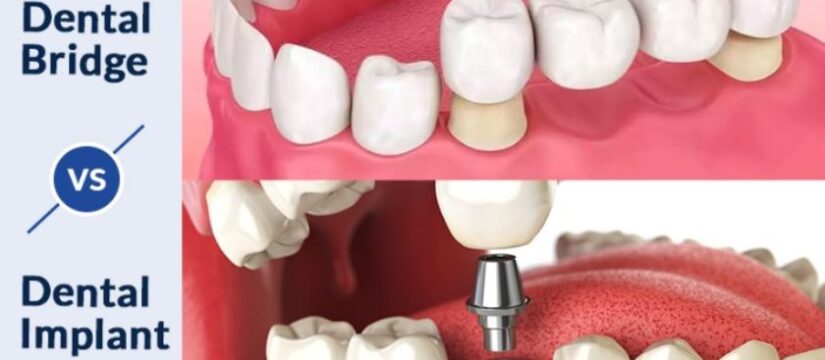
Has a missing tooth left you feeling self-conscious about your smile? With the advancements in dental technology, you have options to restore your pearly whites. “Dental implants vs bridge” is a common debate when considering tooth replacement solutions, but how do you know which one is right for you? This comprehensive guide will walk you through the pros and cons of dental implants vs. bridges, helping you make an informed decision for your dental health.
In this blog post, we will delve into the various aspects of dental implants and bridges, comparing their appearance, functionality, and durability. We’ll also discuss factors to consider when choosing between “dental implants vs bridge”, get advice from experts, and explore alternative tooth replacement options. By the end of this article, you’ll have a better understanding of these dental restorations and be better equipped to choose the best option for your unique situation.
Key Takeaways
- This article compares the appearance, performance and longevity of dental implants and bridges to help readers make an informed decision.
- Consider factors such as cost, overall health, healing time & insurance coverage when selecting a tooth replacement option.
- Potential risks associated with both options should be discussed with a qualified dentist for optimal results.
Understanding Dental Implants and Bridges
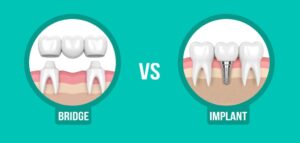
Dental implants and bridges are both designed to replace missing teeth, but they differ in their approach. While dental implants serve as artificial tooth roots that integrate with the jawbone, dental bridges fill the gaps left by missing teeth without replacing the roots. For those considering dental implants Rockville MD, understanding the benefits and differences can help you choose the right option for your needs. Grasping the differences between these two tooth replacement options will aid you in making a well-informed decision for a confident and healthy smile.
Delving into these dental restoration options, we’ll examine each surgical or invasive procedure in detail, beginning with dental implants.
Dental Implants: An Overview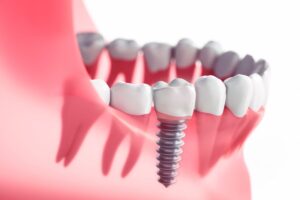
Dental implants, also known as tooth implant, are artificial tooth roots designed to fuse with the jawbone, creating a stable base for replacement teeth, such as artificial teeth. They offer many advantages, such as enhancing the appearance of your smile, stimulating tooth roots, and providing a long-lasting solution with proper oral hygiene. Dental implants do not require support from other teeth, making them a versatile option for replacing one or more missing teeth.
To be eligible for dental implantation, you must have completed bone growth, usually in adolescence. Your dentist may use X-ray or CT scans to evaluate your bone density and quality to determine if you have sufficient bone structure for implantation.
Having familiarized ourselves with dental implants, it’s time to scrutinize dental bridges.
Dental Bridges: An Overview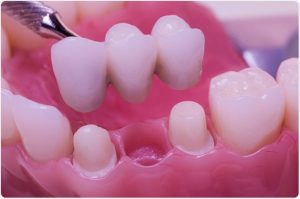
Dental bridges are prosthetic teeth used to replace one or more teeth, especially when there are one or more missing teeth, and are supported by adjacent natural teeth. Dental bridges typically offer several advantages, such as:
- Being more comfortable than partial dentures
- Being more cost-effective than dental implants
- Helping prevent teeth from shifting, maintaining the alignment of your smile.
However, dental bridges do come with potential drawbacks. Some of these include:
- Cleaning them can be challenging
- The invasive procedure carries risks, such as damage to the supporting teeth or gum disease
- Dentists generally recommend waiting until a patient is at least 17 or 18 years old before considering placement of a dental bridge.
Armed with this knowledge of dental implants and bridges, we can now contrast their features.
Comparing Dental Implants and Bridges
Dental implants and bridges differ in several ways, including their appearance, performance, and longevity. Implants often have a more natural look and provide greater longevity, while bridges may be more suitable in cases where multiple consecutive teeth are missing.
We can delve deeper into the distinctions between these tooth replacement options by comparing their appearance, aesthetics, function, comfort, and their durability and longevity in the context of tooth decay.
In the upcoming sections, we will dissect the factors that distinguish dental implants and bridges, aiding you in evaluating the advantages and disadvantages of each option.
Appearance and Aesthetics
One of the main concerns for patients seeking tooth replacement options is the appearance and aesthetics of their smile. Dental implants offer a more natural look and feel compared to bridges, as they can be tailored to complement the color and shape of the adjacent teeth. This seamless cosmetic appearance is one of the many advantages of dental implants.
On the other hand, dental bridges can be crafted to aesthetically complement the adjacent teeth, providing a pleasing solution to filling gaps in the smile. However, bridges may not always appear or feel as organic as implants. When appearance is a factor, consider the benefits of each option to find what suits you best.
Functionality and Comfort
When it comes to functionality and comfort, both dental implants and bridges allow for natural chewing and speaking. However, dental implants may offer greater comfort and stability, as they are affixed directly to the jawbone, providing a more natural feel.
Bridges, on the other hand, are less stable and may require more frequent adjustments. The choice between dental implants and bridges for their functionality and comfort hinges on your unique needs and personal preferences.
Durability and Longevity
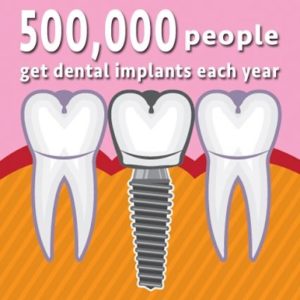
In terms of durability and longevity, dental implants generally last longer than bridges and help prevent bone loss. Implants are made from durable materials and can last up to 25 years with proper care. This longevity makes them a popular choice for those seeking a long-term solution to tooth loss.
Bridges, on the other hand, are typically composed of porcelain and have a shorter lifespan, usually lasting between 5 and 15 years. Although dental bridges may be more affordable initially, their shorter lifespan could result in additional costs for replacement over time. Contemplating the long-term durability of each option is a significant aspect of your decision-making process.
Factors to Consider When Choosing Between Dental Implants and Bridges
Identifying the optimal tooth replacement option for you involves taking into account various factors like cost, overall health, and healing time. Dental implants can be more expensive than bridges, and insurance coverage varies for both options. Additionally, dental implants require good overall health and a healthy jawbone, while bridges may be more suitable for those with compromised health or jawbone conditions.
In the upcoming sections, we’ll examine these factors more closely, assisting you in assessing the pros and cons of dental implants and bridges to make a well-informed decision.
Cost and Insurance Coverage
Dental implants tend to be more expensive than bridges, with implants ranging from $2900 to $5,000 per implant, while bridges usually cost between $1700 to $4,500. Insurance coverage for dental implants and bridges may differ depending on your provider and the type of plan. Consulting your insurance provider to ascertain the coverage available for each treatment option is a crucial step.
In evaluating the cost and insurance coverage of dental implants and bridges, consider the long-term benefits and durability of each option in conjunction with the initial cost.
Overall Health and Jawbone Condition
Dental implant success requires good overall health and a healthy jawbone. If you have compromised health or jawbone conditions, dental bridges may be a more suitable option. Discussing your overall health and jawbone condition with your dentist is critical, as it can assist in determining the ideal tooth replacement option for your particular situation.
Your dentist will assess your oral health and may perform tests, such as X-rays or CT scans, to evaluate your jawbone density and quality. This information will help guide your decision between dental implants and bridges.
Time Commitment and Healing Process
The healing process for dental implants is typically longer than for bridges. Implants require multiple dental visits and a healing period of several weeks or months for the implant to integrate with the jawbone. Conversely, dental bridges can be placed immediately following the preparation of the teeth and usually require only two visits to the dentist.
In contemplating the time commitment and healing process for dental implants and bridges, evaluate your personal schedule, lifestyle, and preferences.
Expert Advice and Second Opinions
Soliciting expert advice and factoring in personal preferences are key elements in determining the ideal tooth replacement option for you. Dentists and prosthodontists provide invaluable insights and guidance based on their expertise, assessing the condition of your teeth and gums and offering recommendations on the most appropriate treatment option.
In addition to expert advice, personal preferences, such as appearance and comfort, play a significant role in choosing between dental implants and bridges. In the subsequent sections, we’ll emphasize the significance of finding a suitable dentist and taking into account your personal preferences.
Finding the Right Dentist

Finding a dentist with experience in both dental implants and bridges can help ensure the best treatment plan for your specific needs. Your dentist will take into account factors such as cost and insurance coverage, overall health and jawbone condition, and the time commitment and healing process associated with each option.
Selecting a dentist with expertise in both dental implants and bridges can provide you with a comprehensive understanding of the advantages and disadvantages of each treatment option, helping you make an informed decision for your dental health.
The Role of Personal Preferences
Your personal preferences, including factors like appearance and comfort, greatly influence the decision between dental implants and bridges. Dental implants offer a more natural look and feel compared to bridges, while bridges can be more comfortable and cost-effective than dental implants.
Considering your personal preferences alongside expert advice will help you determine the best tooth replacement option for your unique situation, ensuring a confident and healthy smile while taking care of surrounding teeth and neighboring teeth.
Potential Complications and Risks
Both dental implants and bridges have potential complications and risks that you should discuss with your dentist prior to making a decision. Dental implant risks include infection, nerve damage, and implant failure, while dental bridge risks involve damage to supporting teeth, gum disease, and the need for replacement over time.
In the upcoming sections, we’ll detail the specific risks that dental implants and bridges carry, aiding you in making an informed decision about your dental restoration.
Dental Implant Risks
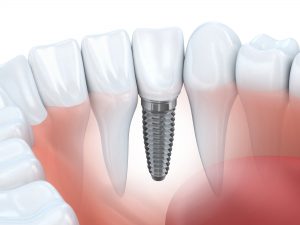
Dental implant risks include:
- Infection
- Nerve damage
- Implant failure
- Sinus issues
- Implant rejection
- Peri-implantitis
- Complications from improper implant placement
- Jaw fracture (uncommon)
- Allergic reactions (uncommon)
- Excessive bleeding (uncommon)
Being aware of these risks will help you make an informed decision about whether dental implants are the right choice for your specific needs and circumstances.
Dental Bridge Risks
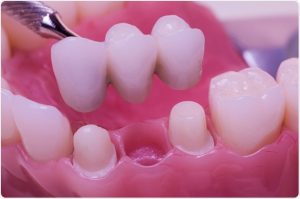
Dental bridge risks involve damage to supporting teeth, gum disease, root canal issues, and the need for replacement over time. If a dental bridge is not fitted correctly or if the adjacent teeth become decayed or weakened, damage to the adjacent teeth may occur. Additionally, if the bridge is not properly fitted or the gums become irritated or inflamed, gum disease may arise.
Understanding these potential risks is essential when deciding whether a dental bridge is the most suitable option for your dental restoration needs.
Alternative Tooth Replacement Options
If dental implants or bridges don’t meet your specific needs, consider alternative tooth replacement options, like partial dentures and space maintainers. Partial dentures are composed of plastic and metal and are used to fill gaps from one or multiple missing teeth. They may be recommended if the teeth surrounding a missing tooth lack sufficient strength to support a bridge.
While partial dentures may offer a more cost-effective solution than bridges or implants, they may not provide the same level of comfort or stability. Discussing alternative tooth replacement options with your dentist can help you determine the best solution for your unique dental needs.
Summary
In summary, dental implants and bridges are both effective tooth replacement options, with each offering unique advantages and disadvantages. Dental implants provide a more natural appearance and greater longevity but may come at a higher cost and require a longer healing process. Bridges, on the other hand, are more cost-effective and quicker to install but may not offer the same level of comfort or durability as implants.
Ultimately, the choice between dental implants and bridges will depend on your personal preferences, overall health, budget, and lifestyle. It’s essential to consult with a dental professional and consider all factors before making a decision. With the right tooth replacement solution, you can restore your confident and healthy smile.
Frequently Asked Questions
Is it better to get an implant or a bridge?
Given the choice, dental implants are generally the better option as they last longer, don’t damage other teeth, and can provide a stronger bite. However, bridges may be more cost effective and still provide a quality solution for missing teeth.
Why choose a dental bridge over an implant?
A dental bridge is a great option if you need to replace a missing tooth, as it stabilizes your adjacent teeth, prevents misalignment, is quicker and easier to adjust to, better distributes biting force, and restores speech and chewing ability.
What is more painful a bridge or implant?
Getting a bridge is generally less painful than getting an implant, as the former requires no surgery.
How long do dental implants and bridges typically last?
Dental implants can typically last up to 25 years with good oral hygiene, while bridges usually have a lifespan of 10-15 years.
Are dental implants more expensive than bridges?
Dental implants can be more costly than bridges, with costs ranging from $2900 to $5,000 for implants compared to between $1700 to $4,500 for bridges.


